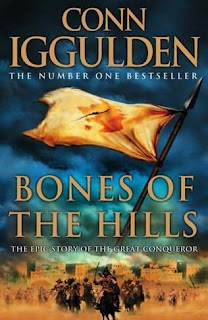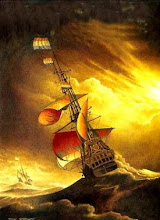 Superior Glokta has a problem. How do you defend a city surrounded by enemies and riddled with traitors, when your allies can by no means be trusted, and your predecessor vanished without a trace? It's enough to make a torturer want to run – if he could even walk without a stick.
Superior Glokta has a problem. How do you defend a city surrounded by enemies and riddled with traitors, when your allies can by no means be trusted, and your predecessor vanished without a trace? It's enough to make a torturer want to run – if he could even walk without a stick.Northmen have spilled over the border of Angland and are spreading fire and death across the frozen country. Crown Prince Ladisla is poised to drive them back and win undying glory. There is only one problem – he commands the worst-armed, worst-trained, worst-led army in the world.
And Bayaz, the First of the Magi, is leading a party of bold adventurers on a perilous mission through the ruins of the past. The most hated woman in the South, the most feared man in the North, and the most selfish boy in the Union make a strange alliance, but a deadly one. They might even stand a chance of saving mankind from the Eaters. If they didn't hate each other quite so much.
Ancient secrets will be uncovered. Bloody battles will be won and lost. Bitter enemies will be forgiven – but not before they are hanged.
“Before They Are Hanged” is the 2nd book in the First Law Trilogy. The First Law Trilogy is actually one long story which is published in three books. Compared to for instance Scott Lynch’s Lock Lamora series, the First Law books are much less suitable to be read as standalone books.
“Before They Are Hanged” is the 2nd book in the First Law Trilogy. The First Law Trilogy is actually one long story which is published in three books. Compared to for instance Scott Lynch’s Lock Lamora series, the First Law books are much less suitable to be read as standalone books.
“Before They Are Hanged” picks up right after the open ended story lines of “The Blade Itself”.
Sand dan Glotka is ‘promoted’ by Arch Lector Sult to the position of Superior of Dagoska; a city state somewhere in the South. His task is to root out traitorous elements in the ruling council of Dagoska and to defend Dagoska from a possible attack by Gurkish forces.
Meanwhile, the Union Army and the merry band of Northmen lead by Threetrees prepare to fight their war against Bethod, the King of the North. The Union army is ill prepared and ill trained. Lord Marshal Burr has enough worries managing the two rivaling generals Kroy and Poulder and Colonel West is burdened with babysitting Prince Ladisla, who proves to be a useless weakling.
The third main plot thread is the quest of Bayaz, Ninefingers, Jezal and Ferro in the far far west. Their journey takes them through a war ravaged Old Empire and a dead ancient city to the very edge of the world where supposedly the Seed, an devilish weapon of enormous can be found. Bayaz is intending to use this weapon against his former co-apprentice Khalul, who is now a prophet behind the Gurkish Emperor and seeking to increase his influence on the world using dark methods.
Once again it was Glokta who stole the show for me. His constant inner dialogue makes Glokta the most developed and best rounded character. Logen Ninefingers is a close second for me, he is the one that ‘carries’ the quest plot thread. Character development is the strong point of this book anyway, like it was in “The Blade Itself”. We see Jezal changing, being humbled by his experiences on the road. Bayaz remains bit of a mystery but perhaps we’ll learn more of his motivations in the last book. Collem West is bit ‘flat’ to me, but I really liked the parts with the Dogman, Black Dow, Tul Duru Thunderhead, Harding Grim and Rud Threetrees. It will be interesting to see where their adventures take them in “Last Argument of Kings”.
Concerning the plot: The war in the North is the only plot thread that remains completely open ended in this book; the other two story arcs have a beginning and an end, but what they actually contribute to the story as in advancement of the plot remains to be seen. Sure, there is the character development, but for me the result of Glokta’s activities in Dagoska and especially the result of Bayaz’ quest left me wondering a bit about the actual contribution to the overall story. (Spoiler ahead: they travel several months to the end of the world and find… nothing? Ah it’s not here - well, let’s get back to the Union then. ) Maybe / probably we will understand some things better after reading “Last Argument of Kings”.
Point of criticism once again: there’s no map. In this book it’s even more annoying than in the first one because the characters are on the move a whole lot more and there are even more references to faraway places. I still think it’s a cop out to not include a map and say it’s because it might restrict the reader’s own fantasy too much. But hey, I rather read a good story without a map then a bad story with a map. And a good story it is.
Conclusion: I liked “Before They Are Hanged” , albeit a little less than “The Blade Itself”. The novelty and freshness of Abercrombie’s approach to the epic fantasy genre is naturally a little less in the 2nd book. Without it there’s still plenty to enjoy – the action, the political intrigue, the humor /cynicism and especially the dialogue, the characters and their development. But regarding plot advancement I have mixed feelings and some of the musings of the main characters tend to get a little repetitive. But still: “Before They Are Hanged” is a very entertaining and enjoyable book and if you enjoyed “The Blade Itself” you will like this one too without a doubt!
8 / 10

















